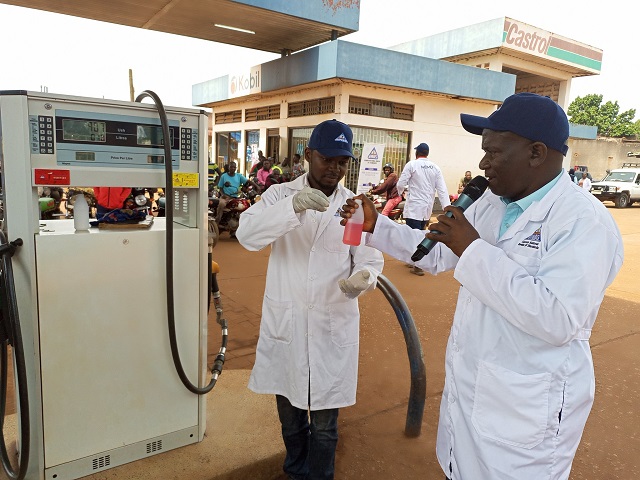
Kampala, Uganda | THE INDEPENDENT | The Uganda National Bureau of Standard-UNBS has resumed operations against dealers in fuel products to rid the market of substandard or adulterated fuel.
The campaign conducted jointly with the Ministry of Energy largely involves sensitizing the public on the adulteration of fuels and under-measurement, as well as testing the quality of the products. Adulteration happens when any foreign substance is illegally introduced into fuel to increase its quantity, leading to non-compliance with standard specifications.
The practice damages automobile engines, prompting them to emit fumes that can negatively impact the environment. The campaigns were suspended in 2020 following the outbreak of COVID-19, which led to restrictions of movement and physical contact between persons.
According to the most recent reports, the adulteration levels have dropped to less than 1 percent, compared to a high of 30 percent in 2000 when the UNBS and the ministry launched the Fuel Quality Monitoring Program. The campaign is designed to cover the entire supply chain, from importation through the fuel terminals, and during transportation up to the pump station tanks and the fuel pump.
UNBS principal analyst and field supervisor Peter Kitimbo says that although less than 1 percent is not as bad, the aim is to ensure a market totally free of adulterated fuel. Kitimbo says that several fuel stations have been closed and the pumps sealed, but that those who break the seal without being allowed face more action including being taken to court.
He explains that when a customer has any suspicion about a fuel station, they are free to ask for the monthly UNBS report because an ordinary person might not tell the difference between good and adulterated fuel.
At the border points, UNBS together with the ministry also carried out marking of the fuel products that are meant for the Ugandan market to avoid dumping and smuggling. This program also has mobile testing vehicles which are used to do spot samples and testing of fuel quality at all fuel retail stations countrywide.
It also verifies and calibrates fuel pumps to ensure accuracy of measurements and value for money to the consumers. There have also been many cases by motorists claiming that some fuel stations give less fuel than they have paid for.
According to the UNBS, there are 3,046 registered fuel stations in Uganda, with the highest concentration being in Kampala. During the Fuel Quality Monitoring Program campaign, motorists and the public at large are also being urged to stay alert while buying fuel from the different fuel stations to avoid being cheated.
“Ensure that fuel is bought from fuel pumps with UNBS stickers. This is confirmation that the fuel pumps were verified and calibrated by UNBS, thus accurate measurements,” UNBS says. Some illegal activity at the pump which may lead to cheating of the customer includes manipulating the pump through continuously using the pump of different vehicles without first stopping it.
“When buying fuel at a filling station, ensure that there is a “break” between the preceding delivery and the next one and the pump sales indicators are set back to zero. Keep an eye on sales indicator up to indication of the desired volume,” Kitimbo says.
Two sides of the same fuel pump can indicate the different quantity of fuel delivered due to wearing away of the mechanical indicators gears, and UNBS says pump attendants often take advantage of this when serving unsuspecting or ignorant motorists.
Kitimbo says at some fuel stations, management displays lower prices on billboards to attract clients yet the actual pump prices are higher, and he says this is illegal because the two must display the same figure.
*****
URN
 The Independent Uganda: You get the Truth we Pay the Price
The Independent Uganda: You get the Truth we Pay the Price





